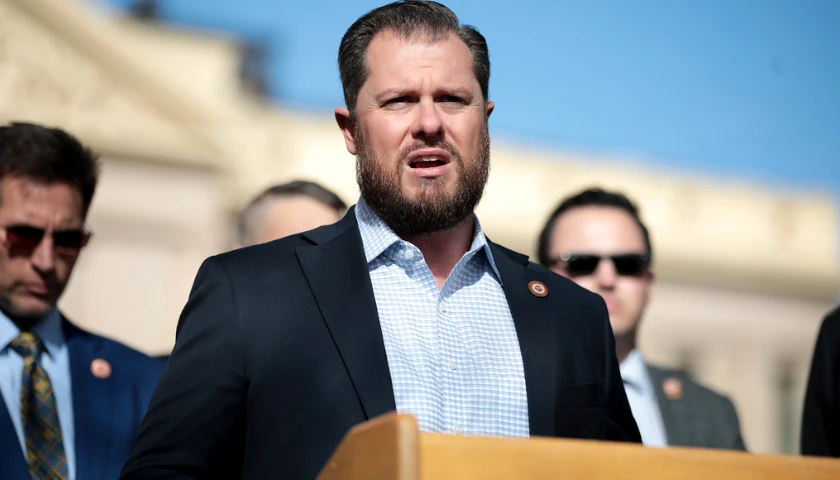by Steve Miller
Democrats and their progressive allies are vastly expanding their unprecedented efforts, begun in 2020, to use private money to influence and run public elections.
Supported by groups with more than $1 billion at their disposal, according to public records, these partisan groups are working with state and local boards to influence functions that have long been the domain of government or political parties.
Registering and turning out voters – once handled primarily by political parties – and design of election office websites and mail-in ballots are being handed over to those same nonprofits, which are staffed by progressive activists that include former Democratic Party advocates, organized labor adherents and community organizers.
Republicans have opposed such efforts, passing legislation in 24 states since 2020 curbing the private financing of elections. But the GOP does not have a comparable, boots-on-the-ground effort to influence election boards and workers, and the private-funding bans haven’t proved absolute in some states.
“There is a cottage industry of 501c3s in public policy and in the political arena, trying to shape the future of immigration or education or any other topic,” said Kimberly Fiorello, a former Republican state representative in Connecticut. “Increasingly they are about elections, election administration, election technology, ballot design, and all with big funding. These groups seem innocuous, but they aren’t innocuous because they are funded by one political side.”
Arabella’s projects, which include the New Venture Fund, the Hopewell Fund, the Sixteen Thirty Fund and Secure Democracy USA, had combined revenues of $1.3 billion between 2020 and 2021, tax filings show. Nonprofits supported by Arabella in 2020 gave out $529 million to “defend democracy.”
That coincided with the rise of private-public election partnerships as Facebook founder Mark Zuckerberg and his wife, Priscilla Chan, donated an estimated $350 million to the progressive Center for Tech and Civil Life (CTCL) to support local efforts in the pandemic-challenged 2020 election.
The voting was marked by social-distancing rule changes encouraging early and mail balloting, imposing policies that Republicans seek to roll back to pre-pandemic rules. The grants of “Zuckerbucks”or “Zuckbucks,” as they are referred to by conservative critics, were supposed to be nonpartisan, but research indicated they were disproportionately allocated to areas to boost Democratic voter turnout.
Apart from legislative curbs on private financing of elections, Republicans so far have not shown any interest in countering their opponents’ strategies. Scott Walter, president of the conservative Capital Research Center, told a Zoom audience of Greenwich, Conn., residents this month that 2020 was an outlier in the way voting was shaped by outside influences.
“It was only in 2020 with the so-called ZuckBucks, and it wasn’t illegal because no one ever dreamt of having something like this,” Walter said. “There haven’t been any efforts by Republicans that we’re aware of to do anything like this anywhere.”
In the past two years, Democratic interests have worked from several angles, pushing back against voter ID, and seeking same-day voter registration, prolonged early voting, and a wide expansion of mail-in voting.
Among the endeavors:
- The training of election officials by CTCL and like-minded organizations promising “nonpartisan” learning opportunities. Such training used to be the primary domain of the Election Center, a 1,500-member trade group that includes election officials and administrators.
- CTCL efforts to generate favorable media coverage: setting up interviews between elections offices and media outlets, and placing op-eds in local newspapers, under the bylines of election officials, using a prewritten template lamenting the lack of public funding for elections.  (Stuart Baum, a CTCL staffer, wrote to Greenwich voting registrars in October: “A reporter from the Washington Post is interested in learning more about your experiences with your aging voting machines … specifically the unfortunate meltdowns that you’ve experienced with them.”)
- Sympathetic local officials alerting CTCL to public records requests for information regarding its work. A December information request from an attorney at the conservative Americans for Public Trust was sent to CTCL by Macoupin (Illinois) County Clerk Pete Duncan, noting “attached is a FOIA you may already be aware of, but I figured I would pass it along to you.”
- Lobbying at the state and federal level. New Venture, the Sixteen Thirty Fund, and the Hopewell Fund spent a combined $6.8 million on lobbying Congress last year, according to Open Secrets. State lobbying records show New Venture, Hopewell, and Secure Democracy have lobbied in at least 41 states over the past five years, spending hundreds of thousands of dollars on issues including election reform.
Lobbying operations provide a more even battlefield as the two parties and their allies have worked vigorously to propose and support new election laws across the country and oppose such measures from the other side. But Democrat efforts draw special concern from foes because they are connected to the same groups that claim they are providing nonpartisan training to election officials and seek to allow private money to flow more freely.
In Georgia, the Hopewell Fund and Secure Democracy USA dispatched lobbyists to the Atlanta capitol building to water down a bill banning private funding of elections two weeks before its passage in March 2021.  They won a loophole that allowed DeKalb County in February to accept a $2 million grant from CTCL – this despite the law’s being drafted in part by Heritage Action for America, the lobbying arm of the conservative Heritage Foundation.
“Now it looks like some of these states will have to go back and amend their legislation to ensure things like DeKalb can’t happen,” Jessica Anderson, the executive director of Heritage Action for America,  told RCI. Georgia lawmakers have moved to strengthen the law following the DeKalb County grant.
In Utah, county clerks in Cache and Weber counties, while so far adhering to the state’s legislative ban on taking grants from outside private groups, have each paid $1,600 to be part of CTCL’s so-called voter integrity plan.
CTCL says more memberships and grants are to be announced soon, “once membership paperwork is finalized,” according to emails obtained by RCI through a public records request.
While Utah lawmakers last year passed a measure prohibiting elections offices from accepting private grants, “the way it’s written, I could technically take grant money if I wanted for certain activities, but I choose not to because I don’t want to push the envelope,” Ricky Hatch, Weber County clerk and a member of CTCL’s advisory board, said in a Zoom event earlier this year.
Hatch did not respond to an interview request.
CTCL’s allies include the National Vote at Home Institute, the Center for Democracy, Voting Rights Lab, Rock the Vote, and the Center for Secure and Modern Elections. The groups over the past several years have worked with CTCL on symposiums and presentations to election officials across the U.S.
The go-to for elections workshops and information has for decades been the Election Center, the national association of election officials, which holds numerous events each year. Now CTCL is among the presenters tentatively scheduled for an April event .
The Election Center’s spokeswoman and CEO of programs is CTCL board director Tammy Patrick, who is also a senior adviser to the elections division of the Democracy Fund.
Patrick said in an email that election training “continues to evolve,” and that as technology changes, more training is needed.
“Although [the] Election Center strives to meet every need our membership has, this is where our relationships with academic institutions, partner organizations and other government agencies plays a vital role in keeping election professionals current,” Patrick wrote.
In related activity, the Biden administration has sought to stem state probes of possible voting malfeasance, sending both broad and specific warnings to states engaged in post-election studies that would potentially catch election malfeasance.
A state audit in Texas found that a former Dallas city council member and convicted felon requested mail ballots for 393 individuals as the 2020 presidential election approached, and an RCI review of the ballot applications found that over 90% of those voters were Democrats.
Teri Hodge, convicted in 2010 on tax fraud charges connected to her alleged role in a city hall bribery and extortion scheme, collected the mail-in ballot applications all over the city as she and several assistants, including Dallas County District Clerk Felicia Pitre, helped beef up the party’s voting base for the election by registering voters, signing up over 400 county residents to automatically receive mail-in ballots.
“This was not illegal,” said Sam Taylor, a spokesman for the Texas Secretary of State’s office.
But the finding would normally lead to a further look into the accuracy of the applications and verification through calling the voters.
As Taylor’s office sought to investigate further, it was thwarted by a directive from the U.S. Department of Justice issued in July 2021 that said contacting voters placed them in jeopardy of violating federal laws regarding voter intimidation.
“There is DOJ guidance that says that talking to voters about things like this [how they applied to vote by mail] is potentially considered voter harassment or voter intimidation,” said Jacqueline Hagan Doyer, legal director of the Forensic Audit Division at the Texas Secretary of State’s office. 
Hodge, who also served on the elections committee as a state representative, could not be reached for comment.
“Since 2018, we’ve seen Democrats catch up with the Republican strategy of getting voters to vote,” said Paul Bentz, a political consultant in Arizona. Voter registration, early voting, and mail-in ballots are cornerstones of the strategy, he said.
The Republican National Committee in 2021 announced its Election Integrity Committee, which produced a 24-page report several months later. The report insisted outside help for elections be prohibited, among other things, but the committee has done nothing since.
“The RNC established an election integrity committee to examine how Democrats attack election integrity – and more importantly, to lay out a blueprint for protecting our elections from the far-left,” RNC Chair Ronna McDaniel told the Washington Examiner after the report was released.
Committee Chairman Joe Gruters did not respond to an interview request.
Mac Warner, West Virginia’s Republican Secretary of State, told RCI that his party needs to become more aggressive in elections, using some of the same tactics as their opponents.
“When you’ve lost so many elections, you finally have to decide to fight fire with fire,” said Warner, who is a gubernatorial candidate for 2024. “You don’t win elections by not getting ballots out there. You can start playing by their rules and win an election. It’s time to go in another direction.”
– – –
Steve Miller is a writer for RealClearInvesigations.
Photo “Mark Zuckerberg” by Anthony Quintano. CC BY 2.0. Background Photo “Election Day” by Phil Roeder. CC BY 2.0.








